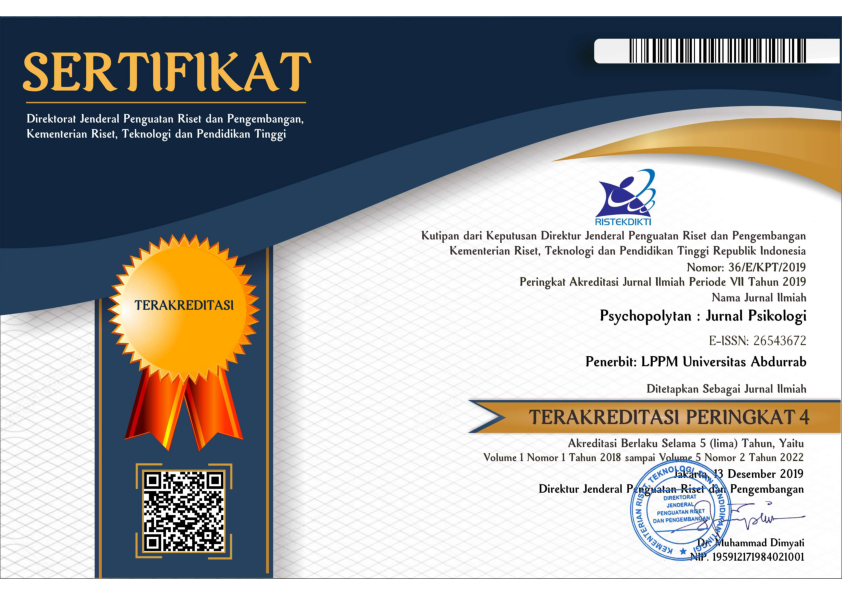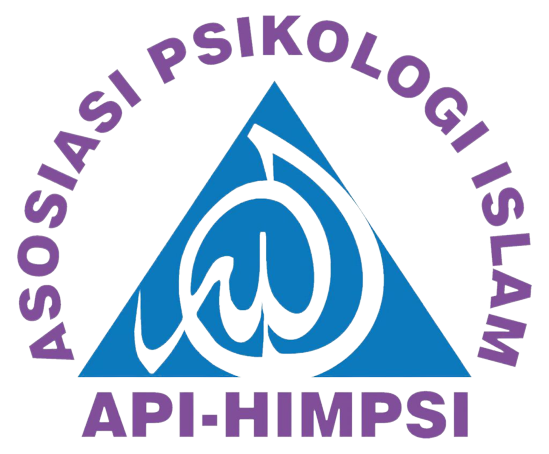Ekstravert, Keterbukaan, dan Aktivisme Digital Prokes Di Instagram
Abstract
Penelitian ini bertujuan untuk mengetahui hubungan antara kepribadian ekstravert dan terbuka dengan hal-hal baru dengan partisipasi mahasiswa dalam aktivisme protokol kesehatan COVID-19 di media sosial Instagram. Subjek penelitian ini adalah 284 mahasiswa perguruan tinggi di Indonesia pengguna Instagram (253 perempuan, 24 laki-laki, dan 7 tidak teridentifikasi) dengan rentang usia 18-24 tahun menggunakan teknik accidental sampling. Penelitian ini menggunakan metode survei dengan pendekatakan korelasional dan teknik pengumpulan data melalui kuesioner daring google form. Kepribadian dan partisipasi dalam aktivisme digital diukur dengan skala Big 5 Personality Traits dan perilaku aktivisme daring. Hasil analisis menunjukkan bahwa terdapat hubungan positif antara kepribadian ekstravert dengan partisipasi dalam aktivisme digital protokol kesehatan dengan nilai r=0,171 dan p=0,004 (p<0,05). Selain itu, terdapat hubungan positif antara kepribadian terbuka dengan hal-hal baru dengan partisipasi dalam aktivisme digital dengan nilai r=0,186 dan p=0,002 (p<0,05). Hal ini menunjukkan bahwa semakin tinggi ekstravert dan keterbukaan dengan hal-hal baru individu, maka semakin tinggi kemungkinan individu tersebut untuk berpartisipasi dalam aktivisme protokol kesehatan COVID-19 di media sosial Instagram. Penelitian ini merupakan masukan bagi pelaku kampanye sehingga pesan dapat lebih tepat sasaran.
References
Chamakiotis, P., Petrakaki, D., & Panteli, N. (2021). Social value creation through digital activism in an online health community. Information Systems Journal, 31(1), 94–119. https://doi.org/10.1111/isj.12302
Cortés-Ramos, A., Torrecilla-García, J. A., Miguel, L. B., Gutiérrez, F. J. P., & Mesa, M. T. C. (2021). Activism and social media: Youth participation and communication. Sustainability (Switzerland), 13(18). https://doi.org/10.3390/su131810485
Dookhoo, S. R., Senior, M. A., Executive, A., & Dodd, M. D. (2019). Slacktivists or Activists? Millennial Motivations and Behaviors for Engagement in Activism.
Duong, H. T., Nguyen, L. T. van, Julian McFarlane, S., Nguyen, H. T., & Nguyen, K. T. (2021). Preventing the COVID-19 Outbreak in Vietnam: Social Media Campaign Exposure and the Role of Interpersonal Communication. Health Communication, 00(00), 1–8. https://doi.org/10.1080/10410236.2021.1953729
George, J. J., & Leidner, D. E. (2019). From clicktivism to hacktivism: Understanding digital activism. Information and Organization, 29(3), 1–45. https://doi.org/10.1016/j.infoandorg.2019.04.001
Gosling, S. D., Rentfrow, P. J., & Swann, W. B. (2003). A very brief measure of the Big-Five personality domains. Journal of Research in Personality, 37(6), 504–528. https://doi.org/10.1016/S0092-6566(03)00046-1
Jima’ain, M. T., Ab Rahman, N. A., Razak, K. A., Mohamad, A. M., & Hehsan, A. (2022). Pilot Study and Data Examination for the Teaching Composition of Higher Order Thinking Skills (HOTs) in the Field of Sirah on Islamic Education Teachers. Jurnal Ilmiah Peuradeun, 10(3), 613. https://doi.org/10.26811/peuradeun.v10i3.694
Jordan, G., Pope, M., Wallis, P., & Iyer, S. (2015). The Relationship Between Openness to Experience and Willingness to Engage in Online Political Participation Is Influenced by News Consumption. Social Science Computer Review, 33(2), 181–197. https://doi.org/10.1177/0894439314534590
Laverack, G. (2013). Health activism: The way forward to improve health in difficult times. Global Health Promotion, 20(3), 49–52. https://doi.org/10.1177/1757975913499038
Mcclellan, C., Ali, M. M., Mutter, R., Kroutil, L., & Landwehr, J. (2017). Using social media to monitor mental health discussions-evidence from Twitter. Journal of the American Medical Informatics Association, 24(3), 496–502. https://doi.org/10.1093/jamia/ocw133
McLeod, S. (2019). What does effect size tell you?. Simply Psychology. https://online210.psych.wisc.edu/wp-content/uploads/PSY-210_Unit_Materials/PSY-210_Unit09_Materials/McLeod_EffectSize_2019.pdf
Munshi, J. (2014). A Method for Constructing Likert Scales. SSRN Electronic Journal, 1–12. https://doi.org/10.2139/ssrn.2419366
NapoleonCat. (2021). Instagram users in Indonesia (November 2021). Napoleoncat.Com. https://napoleoncat.com/stats/instagram-users-in-indonesia/2021/11/#:~:text=There%20were%2092%20527%20400,33.1%25%20of%20its%20entire%20population.
Omoto, A. M., Snyder, M., & Hackett, J. D. (2010). Personality and motivational antecedents of activism and civic engagement. Journal of Personality, 78(6), 1703–1734. https://doi.org/10.1111/j.1467-6494.2010.00667.x
Pulford, B. D., & Sohal, H. (2006). The influence of personality on HE students’ confidence in their academic abilities. Personality and Individual Differences, 41(8), 1409–1419. https://doi.org/10.1016/j.paid.2006.05.010
Ribeiro, E. A., & Borba, J. (2016). Personality, Political Attitudes and Participation in Protests: The Direct and Mediated Effects of Psychological Factors on Political Activism. Brazilian Political Science Review, 10(3). https://doi.org/10.1590/1981-38212016000300003
Saleh Tamima El Kahhal Carine Abou Seif, J., Kahhal, E., & Seif, A. (2011). Personality traits and political participation Personality traits and political participation Recommended Citation Recommended Citation. https://fount.aucegypt.edu/studenttxt/19
Salkind, N. J., & Frey, B. B. (2019). Statistics for People Who Think They Hate Statistics (7th ed.). SAGE Publications.
Shum, J., & Sterbenk, Y. (n.d.). The Effects of Personality Types (Introversion-Extraversion) on Promoting Feminism on Social Media Platforms.
Suwana, F. (2020). What motivates digital activism? The case of the Save KPK movement in Indonesia. Information, Communication & Society, 23(9), 1295–1310. https://doi.org/10.1080/1369118X.2018.1563205
Thompson, M. (2008). Individual Difference Theory and Research: Application to Multinational Coalition Teamwork. 1–18.
Vantilborgh, T., Bidee, J., Pepermans, R., Willems, J., Huybrechts, G., & Jegers, M. (2013). Revisiting the relationship between personality and psychological contracts: A moderated mediation model explaining volunteer performance. Social Service Review, 87(1), 158–186. https://doi.org/10.1086/669825
Vraga, E. K., Stefanidis, A., Lamprianidis, G., Croitoru, A., Crooks, A. T., Delamater, P. L., Pfoser, D., Radzikowski, J. R., & Jacobsen, K. H. (2018). Cancer and Social Media: A Comparison of Traffic about Breast Cancer, Prostate Cancer, and Other Reproductive Cancers on Twitter and Instagram. Journal of Health Communication, 23(2), 181–189. https://doi.org/10.1080/10810730.2017.1421730
Wang, X., & Huang, C. R. (2021). From Contact Prevention to Social Distancing: The Co-Evolution of Bilingual Neologisms and Public Health Campaigns in Two Cities in the Time of COVID-19. SAGE Open, 11(3). https://doi.org/10.1177/21582440211031556
Widayati, A. (2021). Knowledge, Perceptions, and Awareness Related to COVID-19 Among the Indonesian Adults During the Outbreak’s Escalation Period: A Cross-Sectional Online Survey in Yogyakarta Province, Indonesia. Asia-Pacific Journal of Public Health, 33(4), 448–450. https://doi.org/10.1177/10105395211001655
Copyright (c) 2023 Psychopolytan : Jurnal Psikologi

This work is licensed under a Creative Commons Attribution-NonCommercial-ShareAlike 4.0 International License.
1. Copyright of all journal manuscripts is held by the Psychopolytan : Jurnal Psikologi
2. Formal legal provisions to access digital articles of electronic journal are subject to the provision of the Creative Commons Attribution-ShareAlike license (CC BY-NC-SA), which means that Psychopolytan : Jurnal Psikologi is rightful to keep, transfer media/format, manage in the form of databases, maintain, and publish articles.
3. Published manuscripts both printed and electronic are open access for educational, research, and library purposes. Additionally, the editorial board is not responsible for any violations of copyright law.
licensed under a Creative Commons Attribution-ShareAlike 4.0 International License.
 pdf
pdf
 Abstract views: 300
Abstract views: 300
 downloads: 369
downloads: 369

 :
:







